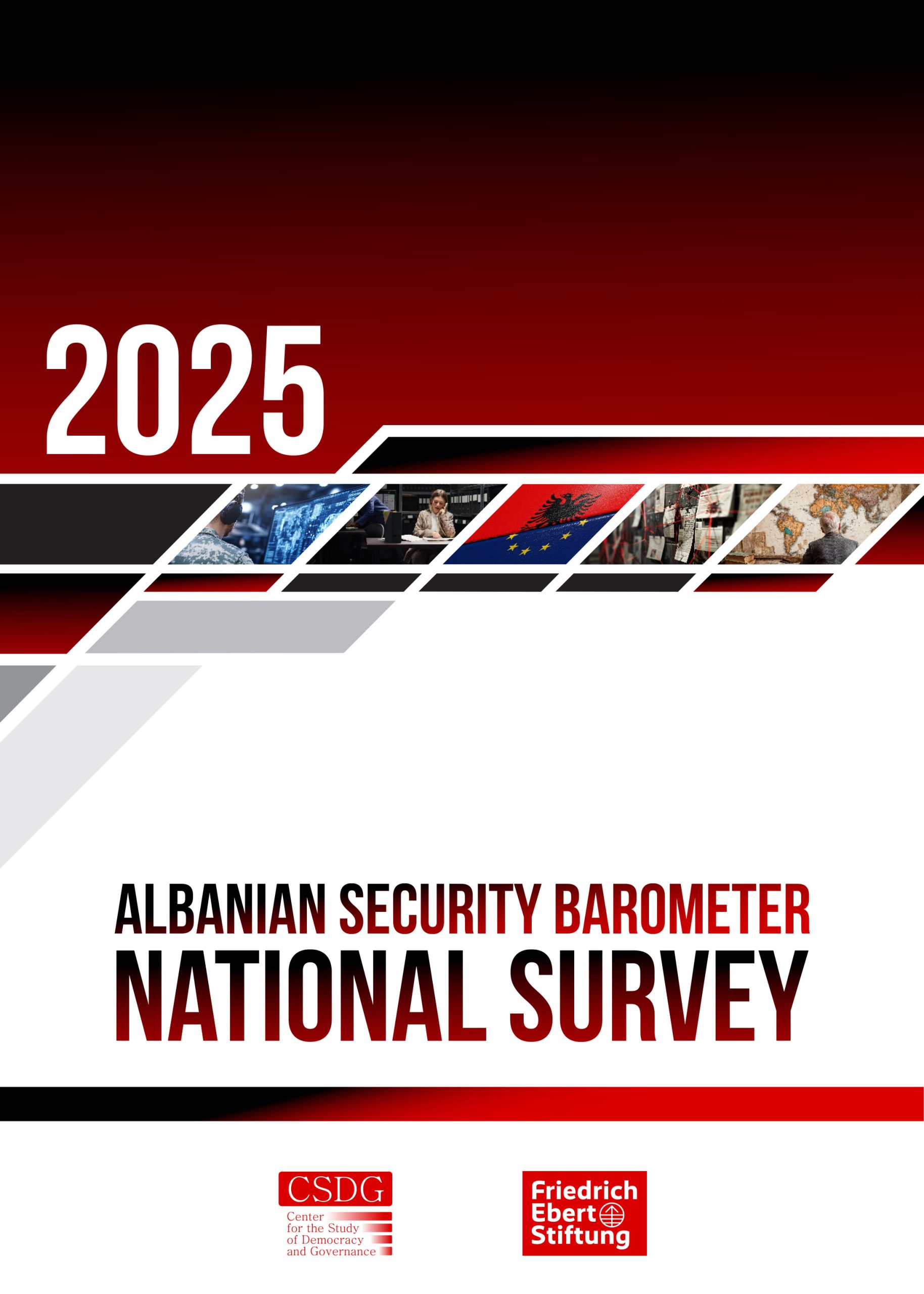
The Center for the Study of Democracy and Governance (CSDG), in partnership with Friedrich Ebert Stiftung (FES), is proud to announce the release of the Security Barometer 2025. This flagship annual report offers a comprehensive look at how Albanians perceive security, trust in institutions, and the challenges shaping the country’s democratic resilience.
In a rapidly changing regional and global environment, understanding the intersection of public sentiment, institutional performance, and security priorities is essential. The Security Barometer 2025 equips decision makers and stakeholders with new knowledge and insights.
Key highlights from this year’s edition:
•  Public perceptions and threat landscape — Corruption and organised crime top the list of perceived threats, far outweighing fears of external military conflict or other risks. Safety is seen as dependent on institutional integrity and accountability.
Public perceptions and threat landscape — Corruption and organised crime top the list of perceived threats, far outweighing fears of external military conflict or other risks. Safety is seen as dependent on institutional integrity and accountability.
•  Institutional trust and performance — SPAK and Special Courts are viewed as more insulated from political or criminal influence, while political parties and parts of the justice system face low trust. Sentencing is widely seen as too lenient, fostering impunity.
Institutional trust and performance — SPAK and Special Courts are viewed as more insulated from political or criminal influence, while political parties and parts of the justice system face low trust. Sentencing is widely seen as too lenient, fostering impunity.
•  Regional relations and geopolitical orientation — Strong support for Balkan cooperation, clear Western alignment, and high trust in the EU, US, and NATO as security anchors. Serbia is perceived as the main regional threat; Russia is viewed negatively, China neutrally.
Regional relations and geopolitical orientation — Strong support for Balkan cooperation, clear Western alignment, and high trust in the EU, US, and NATO as security anchors. Serbia is perceived as the main regional threat; Russia is viewed negatively, China neutrally.
•  EU Membership Outlook — Overwhelming support for EU accession, driven by hopes for economic opportunity, mobility, and democratic values. Optimism about joining by 2030 coexists with doubts about meeting criteria in time.
EU Membership Outlook — Overwhelming support for EU accession, driven by hopes for economic opportunity, mobility, and democratic values. Optimism about joining by 2030 coexists with doubts about meeting criteria in time.
•  Organised Crime — scope, drivers and impact — Seen as a serious national problem concentrated in certain regions, with roots in poverty, unemployment, and institutional weakness. Believed to distort markets, infiltrate politics, and influence elections through vote buying and intimidation.
Organised Crime — scope, drivers and impact — Seen as a serious national problem concentrated in certain regions, with roots in poverty, unemployment, and institutional weakness. Believed to distort markets, infiltrate politics, and influence elections through vote buying and intimidation.
•  Elections and criminal influence — Majority believe organised crime affects campaigns and results. SPAK is the most trusted actor to counter electoral interference; political parties are seen as failing in this role.
Elections and criminal influence — Majority believe organised crime affects campaigns and results. SPAK is the most trusted actor to counter electoral interference; political parties are seen as failing in this role.
•  Trends, reform effectiveness and expectations — Many feel organised crime has grown or remained unchanged in recent years. The 2015 Law on Decriminalisation is seen as only partially effective. EU and US are trusted partners in reform efforts.
Trends, reform effectiveness and expectations — Many feel organised crime has grown or remained unchanged in recent years. The 2015 Law on Decriminalisation is seen as only partially effective. EU and US are trusted partners in reform efforts.
•  Victimisation and crime reporting — Direct victimisation is low, but indirect exposure is common. Reporting rates remain low due to fear of retaliation, distrust in authorities, and lack of legal awareness. Crimes by powerful actors and domestic violence are seen as most likely to go unreported.
Victimisation and crime reporting — Direct victimisation is low, but indirect exposure is common. Reporting rates remain low due to fear of retaliation, distrust in authorities, and lack of legal awareness. Crimes by powerful actors and domestic violence are seen as most likely to go unreported.
